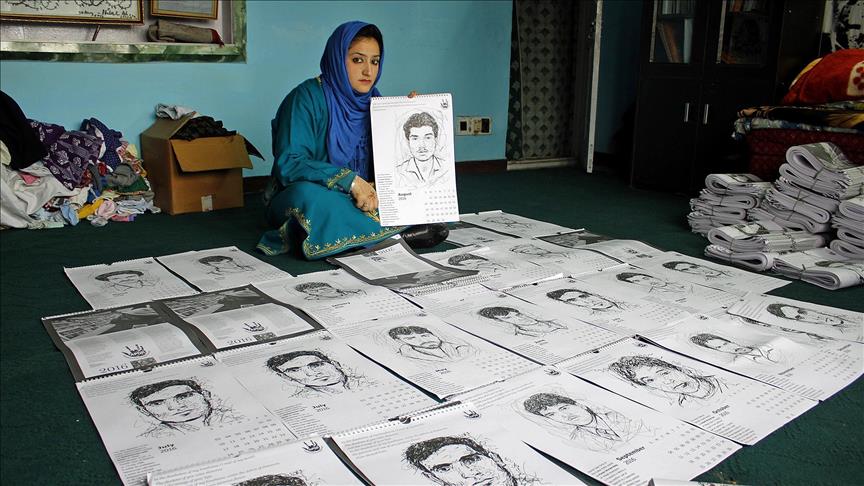Calendar pays tribute to Jammu Kashmir's disappeared youth
Decades after they first went missing, Indian-held Jammu Kashmir’s 'disappeared' youth will return home this year – on pages of memorial calendar
 Photo credit: Shahid Tantray
Photo credit: Shahid Tantray
SRINAGAR, Jammu Kashmir
Years after they first went missing, Indian-held Jammu Kashmir’s disappeared youth will finally return home this year as pictures on the pages of a 2016 commemorative calendar.
The calendar is both a memorial and a form of protest. According to its creators, the project is part of the ongoing fight to keep the memory of the region’s disappeared youth alive.
The calendar was designed and created by the Association of Parents of Disappeared People (APDP), which was established by the relatives of people in Jammu Kashmir believed to have been forcibly disappeared by the Indian army since 1990.
Each page features a sketch of a person who went missing in the corresponding month.
January, for example, bears the image of Abdul Hamid Badyari, a 28-year-old auto-rickshaw driver who was last seen on January 20, 1990, when he was detained by Indian soldiers.
For the last quarter century, Badyari’s parents, wife and two children have been looking for him, but -- like thousands of other missing Kashmiris -- he was never seen again.
According to the APDP, over the past two and a half decades, more than 8,000 young people in Jammu Kashmir have been forcibly disappeared by the Indian army.
"Since our boys were disappeared, we have been asking the Indian government to tell us where they are," APDP Chairperson Parveena Ahangar told Anadolu Agency.
"If they are alive, return them to us; if they have been killed, tell us what happened so we can stop this endless waiting," Ahangar said.
Suspected disappearances by the Indian government in Jammu Kashmir have left behind countless mothers and fathers desperately looking for their children; wives who are now unsure of their marital status and have come to be known as "half-widows"; and thousands of orphans.
For over a decade, the APDP has been trying to create a memorial to the disappeared, but the Indian-backed government in Jammu Kashmir has consistently stonewalled the process.
‘Common struggle’
A sketch of Ahangar’s son, Javaid Ahmad, adorns the page for the month of August on the 2016 calendar.
Ahmad never returned home after being picked up by Indian troops in August of 1990 in Srinagar’s Batamaloo neighborhood. He was 17 at the time.
Ahangar says she has looked for her son in every prison, every army camp, and every torture center she could find in the region.
"At first I was told by police and army men that they had my son, but -- as time passed -- they said they had no knowledge of him," she said.
"During my search, I found hundreds of men and women like me, searching for their vanished loved ones," she added.
"That’s when we established the organization and came together for our common struggle," she told Anadolu Agency.
Some 4,000 copies of the calendar have been printed so far by the APDP, members of which told Anadolu Agency that they planned to distribute the first batch of copies to relatives of the disappeared.
Remaining copies, they said, would be distributed to media organizations, human rights bodies and NGOs.
"Each picture is accompanied by a brief biography of the disappeared person, who arrested them, and who they are survived by," Ahangar explained.
"We want these people to be in front of our eyes for an entire month, so as to not let ourselves forget our loved ones," she added.
The calendar also carries verses from leftist Pakistani Urdu poet Faiz Ahmad Faiz and 16th-century Kashmiri poetess Habba Khatoon, who was also queen to Kashmir’s last indigenous ruler, Yousuf Shah Chak.
Chak was invited to New Delhi by the Mughal emperor Akbar to discuss peace while their two armies fought. Instead, however, Chak was imprisoned for life by the emperor, bringing Kashmir under Mughal rule (and, later, under a number of foreign rulers).
Kashmir, a Muslim-majority Himalayan region, is held by India and Pakistan in parts and claimed by both in full. A small sliver of Kashmir is also held by China.
Pakistan and India have fought three wars -- in 1948, 1965 and 1971 -- since the partition of the latter in 1947, two of which were fought over Kashmir.
Since 1989, pro-independence groups in Jammu Kashmir have fought Indian rule to demand autonomy or unification with Muslim-majority Pakistan.
More than 70,000 Kashmiris have been killed in the violence, most of them by Indian forces.
India currently maintains over half a million troops in the part of the region under its control.
Anadolu Agency website contains only a portion of the news stories offered to subscribers in the AA News Broadcasting System (HAS), and in summarized form. Please contact us for subscription options.







